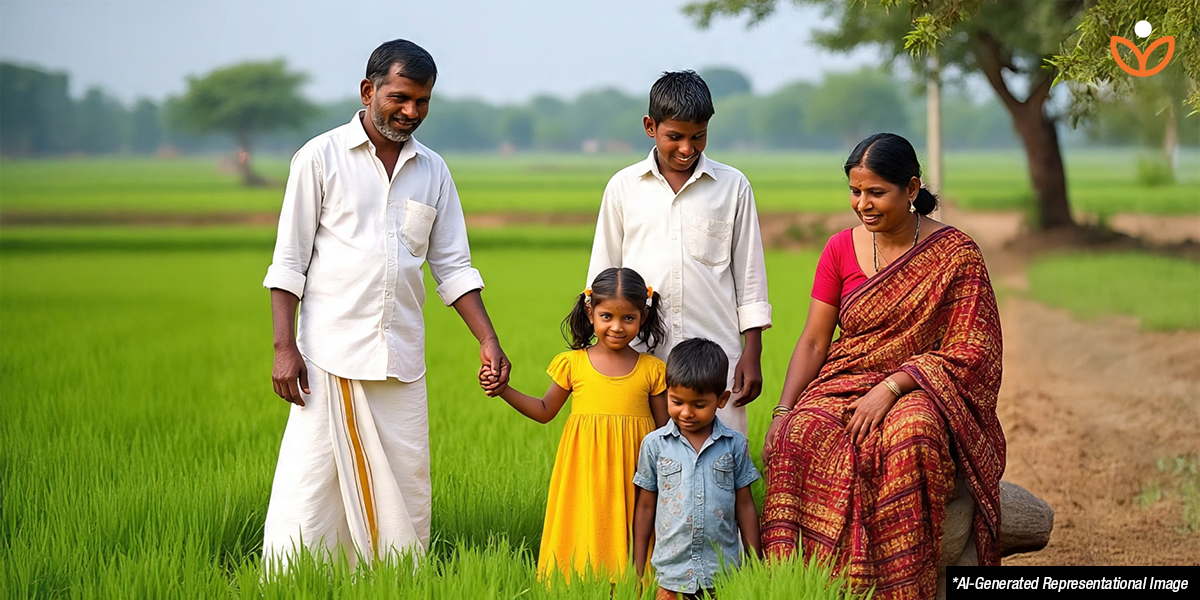
Does parenting come with a manual? Yes, No, or maybe!
Here’s an excerpt from a conversation between father and practitioner interview, showcasing how parenting is not much about perfection but more about patience, presence and partnership and that is what it takes to rebuild trust and relationships after separation.
In the village of Chandan Hosur, Karnataka, a daughter, Shruti (name changed) returned home after living in a Child Care Institution (CCI). For Krishnaraj (name changed), a father of three, the meaning of parenting deepened when his daughter returned. Shruti was placed in institutional care in 2022 due to her family’s extreme poverty and conflict. Krishanraj left the family and his wife raised the children alone in a rented house with small income. During Shruti’s tenure in CCI, her mother visited her regularly and both mother and daughter were supported through counseling. Later, with support from Miracle Foundation India, the CCI team connected with the father and worked on stabilizing the family through counseling sessions, training etc Shruti’s parents were reunited, and after sustained counseling, Shruti agreed to return home.
Parenting as Presence: What the Father Says
When asked how parenting feels today, Krishanraj’s response is simple but powerful. “We all eat together at dinner every day,” he shares. “That’s when the children tell us what happened at school or home. We listen.”
“My elder daughter helps her mother with housework. Her brothers take care of domestic animals. In the evening, the boys go to play, and my daughter stays at home.”
Krishanraj shares that parenting is not an external set of instructions but more quieter and consistent act of presence. He describes his family life where all roles are naturally distributed.
He notices that when his child is upset, he actively involves them in everyday decisions.
“If we see they are sad or angry, we talk. We try to understand. Maybe it’s something at school, maybe something at home. And then we comfort them.”
And it’s not just listening, Krishanraj ensures that his children actively participate in home life.
“Our children are always with us, whatever work we do, whatever decisions we take at home, they are part of it.”
When Krishanraj was asked how his family celebrates when something good happens, his answer was simple:
“When our child is happy, we feel proud and happy too. We share it with our close relatives and all join in prayer.”
These small gestures of sharing joy, including children in decisions, and building predictable routines, help children and families stay united and thrive.
Shruti has now very well reintegrated in the family, she participates fully in rhythm of family life, she enjoys doing house chores, she is happy attending school regularly, and also love spending time with her siblings. The same father she once resisted is now part of her everyday.
Parenting Through Pressure: Managing Without Burnout
Though life remains challenging, Krishanraj says he hasn’t experienced deep parenting fatigue, his responses reflect awareness and coping:
“No, that kind of situation has not come yet. But if it does, my wife and I are ready to face it together.”
Krishanraj and his wife find ways to manage stress together. He says, “These days we don’t feel that burden too much,” he says. “But if we are tired, we support each other…. Every Sunday, we take a break from work and spend quality time with the family. If we’re under pressure, we listen to prayers on TV or another device. That helps.”
While terms like “self-care” or “parental burnout” may not be used, the practices are evident through weekly breaks, spiritual grounding, and shared responsibilities between parents.
What Families Need: Not Handouts, but Guidance
One of the most compelling moments in the conversation comes when Krishanraj is asked what kind of help would make parenting easier.
“We are not asking for gifts or money,” he says. “We only want guidance from people who understand our life and can help us take the right steps.”
This perspective echoes what many rural families and other vulnerable families in communities feel, what they seek is not charity, but dignity, support, and respectful partnership.
A Family Restored, A Future Reimagined
At present, Shruti is back home with her parents and siblings. She attends a local school and continues to receive follow-up support. Her family’s Thrive Scale assessment shows steady improvement in living conditions, education, and relationships.
Through the voice of a father who listens and a daughter who returns, we are reminded that parenting at its core is about connection. It’s about sitting together at dinner. Talking. Listening. Belonging.
Author: Praveen Gonsalves-Program Officer, Family-Based Care, Anmol Tangudhama, Karnataka
Disclaimer: The article was originally published on IACN Quarterly – Issue 19. The views expressed in the article are the author’s and do not necessarily reflect those of Miracle Foundation India.
